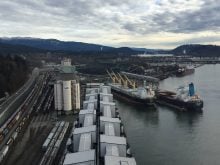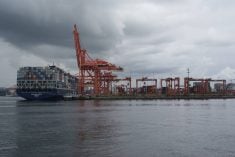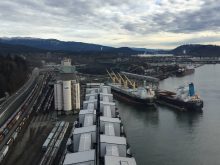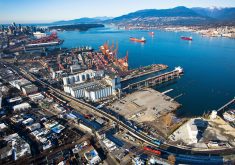VANCOUVER (Reuters) — Dock workers on Canada’s Pacific coast said they have revoked a strike notice issued for Saturday after Prime Minister Justin Trudeau directed a crisis meeting to pursue all options to ensure the stability of supply chains as he stressed the critical role of port operations.
The strike notice revoked had been issued earlier Wednesday, just hours after a federal watchdog ruled the workers’ current stoppage was illegal.
“Effective immediately the strike notice dated July 22 for 9 a.m. has now been removed,” the International Longshore and Warehouse Union (ILWU) Canada said in a post on its website on Wednesday.
Read Also

Trump’s tariffs take their toll on U.S. producers
U.S. farmers say Trump’s tariffs have been devastating for growers in that country.
Amid mounting calls for resolute government action to end the strike, Trudeau convened a meeting of the Incident Response Group, which comprises senior officials and ministers and meets only in cases of crisis.
In a statement released following the meeting, the Prime Minister’s Office said Trudeau had stressed the critical importance of operations at the ports resuming as soon as possible, and said workers and employers across Canada cannot face further disruptions.
“He asked ministers and senior officials their advice toward achieving this goal and directed them to pursue all available options to ensure the stability of our supply chains and to protect Canadian jobs and our economy,” the statement said.
The strike has upended operations at Vancouver and Prince Rupert, two of Canada’s three busiest ports, which are key gateways for exporting natural resources and commodities and bringing in raw materials.
The Canada Industrial Relations Board said the strike must end because the union had not provided the required 72-hour notice before pulling workers off the job on Tuesday.
The union responded by issuing a new 72-hour strike notice, an ILWU official told Reuters by phone, before that notice was later revoked.
Some 7,500 dock workers have been picketing the two ports almost non-stop since July 1. A Reuters witness said there was no sign of pickets at Vancouver’s port on Wednesday.
On Tuesday the ILWU leadership rejected a tentative four-year contract deal agreed with employers less than a week ago that ended a 13-day strike.
The employers association accused the union of “holding the Canadian economy hostage.”
The walkout is estimated to have disrupted $6.5 billion of cargo movement at the ports, based on Canadian Manufacturers & Exporters’ calculation of about $500 million in disrupted trade each day.
“My patience has run out,” Transport Minister Omar Alghabra told reporters when asked whether the government would pass back-to-work legislation, a politically tricky move. Ministers, he added, were exploring all options.
Legislation forcing workers back to their posts was favoured by the premiers of Alberta and Saskatchewan, the Canadian Chamber of Commerce and Canadian Manufacturers and Exporters.
But British Columbia premier David Eby said passing such legislation would take too long and urged the two sides “to sort it out at the table as quickly as possible.”
Federal Conservative leader Pierre Poilievre earlier said Trudeau should come up with a plan to end the strike within 24 hours but did not say whether he would support back-to-work legislation.
The federal NDP, which traditionally enjoys union backing, has been helping Trudeau’s minority government pass legislation. Its leader, Jagmeet Singh, ruled out support for a law to end the strike.
That means Trudeau would need the votes of the Conservatives, who have been trying to court workers and unions, or the separatist Bloc Quebecois.
It also means the Liberal-NDP deal that is keeping the government going could be put under strain if Trudeau ends up forcing workers back to work.















